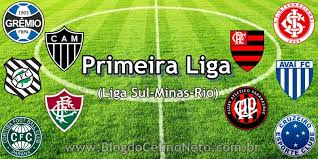By Samindra Kunti
January 29 – Last wednesday a new club competition the ‘Primeira Liga’ got underway in Brazil. The tournament doesn’t represent Brazil’s very own 1992 breakaway Premier League moment, but could be an important milestone in the development of the domestic game.
A healthy crowd of 30,000 flocked to the Mineirao stadium, the venue of Brazil’s infamous 7-1 semi-final defeat by Germany at the last World Cup, to watch Flamengo take on local hosts Atletico Mineiro in the opening game of the Primeira Liga, also referred to as the Sul-Minas-Rio Cup. Peruvian centre-forward Guerrero scored a brace to end his lean streak and gift Flamengo a comprehensive 2-0 victory.
The game had quality and a healthy attendance, but its political context mattered far more: 12 clubs from five Brazilian states have forged this new league, which will last until the end of March. Rio de Janeiro giants Flamengo and Fluminense are participating together with the big two from Belo Horizonte, Cruzeiro and Atletico Mineiro. Gremio and Internacional represent Rio Grande do Sul.
The position of the giant Sao Paulo clubs – currently not in this competition – will likely prove to be the make or break for the new league.
The Brazilian FA CBF and the State Federations fear the pernicious consequences of a league that may well challenge the long-standing power structure of the Brazilian game. For a long time the State Federations were the CBF’s power base: jointly they organise the state championships, a procession of David-vs-Goliath matches with no real beneficiaries, except power-craving football administrators.
The government of Brazilian president Dilma Rousseff recently enacted a far-reaching change that turned the State Federations’s position upside down: all 40 clubs in Brazil’s top flight and Serie B now enjoy voting rights in CBF’s procedures, diluting the once comfortable majority held by the 27 State Federations.
“They will only play [the Primeira Liga] if they really want to start a war,” said the president of Rio State Federation FERJ Ruben Lopes in an interview with Globoesporte. “And war, my friend, only ends in casualties.”
He also condemned the Primeira Liga as ‘anarchist’ and the clubs involved as ‘elitist’ and ‘militiamen.’
On Monday the CBF released a signed declaration banning the Primeira Liga, but that assertion rang hollow, both judicially and image-wise: Wednesday’s first round of Primeira Liga matches fell during the Brazilian pre-season. Neither the CBF nor FERJ had the legal authority to act against those technically non-competitive matches.
The CBF haven’t got much space to maneuver either against the Primeira Liga and both Flamengo and Fluminense, two of Brazil’s biggest clubs, because the institution’s current reputation leaves little to the imagination. In December the FBI indicted the CBF’s high commander Marco Polo Del Nero. Swiss and American authorities had previously also entrapped Jose Maria Marin and Ricardo Teixeira, Del Nero’s predecessors. All three were key figures in the organisation of the 2014 FIFA World Cup.
In the meantime the CBF, wary of its rock-bottom credibility, have now backpedalled and embraced, though not whole-heartedly, the Primeira Liga, stressing that the character of the league must remain non-competitive and shouldn’t interfere with the state championships.
“We do want to preserve the heritage of the Sul-Minas-Rio Cup,” said CBF general-secretary Walter Feldman following lengthy negotiations and talks as intermediary with FERJ president Rubens Lopes, Flamengo president Eduardo de Mello and Fluminense president Peter Siemsen.
“It is positive for Brazilian football and will bring greater financial health for the region,” continued Feldman. “This year would be poorly structured because of this conflict and we decided that the conflict shouldn’t prevent the establishment of the league.”
The debutant competition may be a landmark moment for Brazilian football, suffering from an institutional crisis: the CBF is fragile, the national team is stagnant, the clubs are mired in debts and 85% of the players earn little more than the minimum wage. At best, Brazilian football has become a protracted tragicomedy.
History suggests though that a larger split won’t per se change the narrative of the Brazilian game. In 1987 when the CBF faced bankruptcy and was no longer in a position to cover the running costs for Brazil’s domestic league, Brazil’s biggest clubs formed the ‘Clube Dos 13,’ organizing their own tournament, generating profitable sponsorship deals with Brazilian TV behemoth Globo and Coca-Cola.
‘The Clube Dos 13’ backpedalled as the group’s president Carlos Miguel Aidar, who recently resigned as president of Sao Paulo FC over allegations of corruption, reconciled with CBF boss Nabi Abi Chedid and abandoned plans for a second independent competition in 1988.
This time around the movement hasn’t taken on such dramatic proportions yet – much hinges on the position Sao Paulo’s clubs will take. Sao Paulo is Brazil’s richest state and its state championship is relatively sustainable. Will those clubs join the Primeira Liga or will they rally against it?
But the Primeira Liga does signal a proactive stance from the clubs to solve their own problems and may well spark a much-needed overhaul of Brazil’s domestic game.
Contact the writer of this story at moc.l1734876253labto1734876253ofdlr1734876253owedi1734876253sni@i1734876253tnuk.1734876253ardni1734876253mas1734876253

